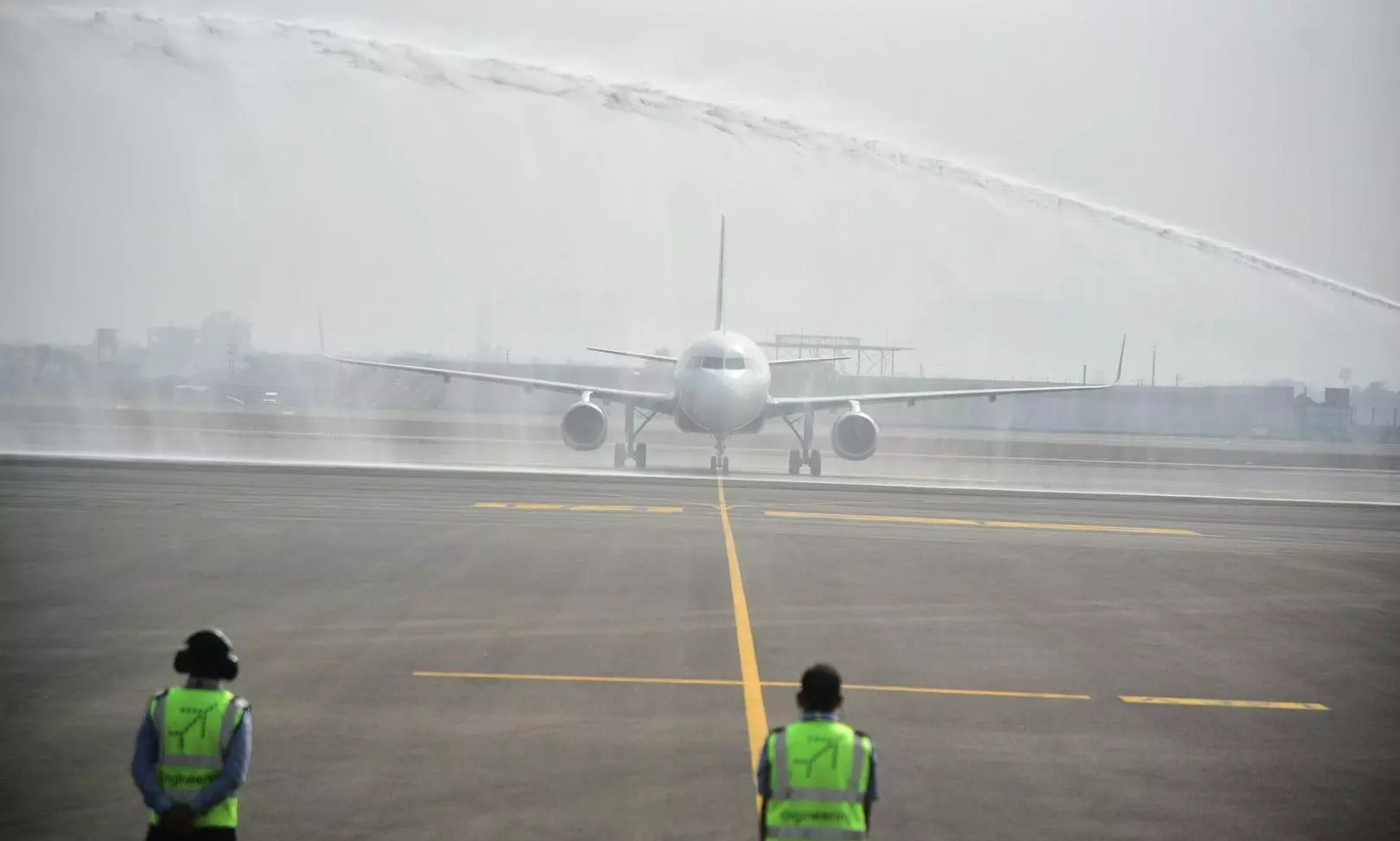Navi Mumbai Airport nears launch: What it means for air cargo
Navi Mumbai International Airport (NMIA) receives ad-hoc tariff approval ahead of launch; cargo operators get clarity on costs, incentives, and timelines.

First flight validation test at NMIA conducted by IndiGo's Airbus A320 on Sunday, December 29, 2024
NMIA receives ad-hoc tariff approval ahead of launch; cargo operators get clarity on costs, incentives, and timelines.
Navi Mumbai International Airport (NMIA), the most anticipated greenfield aviation project in India in over a decade, is expected to begin commercial operations later this year. As the runway nears readiness, attention has now turned to the pricing framework that will govern operations at the airport — especially critical for airlines, cargo operators, ground handlers, and logistics companies looking to enter India's one of the busiest air cargo catchment zones.
In February 2025, NMIAL — the special purpose vehicle established to develop and operate NMIA — submitted its Multi-Year Tariff Proposal (MYTP) to the Airports Economic Regulatory Authority of India (AERA). This document outlined a roadmap of investments, traffic expectations, and operating costs. However, while the proposal is still under regulatory review, AERA has provisionally approved an ad-hoc tariff structure that allows NMIA to start charging for aeronautical services from its Commercial Operation Date (COD) until March 31, 2026, or until a final tariff order is issued.
A dual airport system for India’s financial capital
The vision for NMIA emerged from the urgent need to decongest Chhatrapati Shivaji Maharaj International Airport (CSMIA) in Mumbai, which is already operating near capacity on both passenger and cargo fronts. NMIA is being developed through a public-private partnership: Mumbai International Airport Limited (MIAL) holds a 74% stake in the operating company NMIAL, while the City and Industrial Development Corporation of Maharashtra (CIDCO) retains the remaining 26%. Through MIAL, Adani Airport Holdings Ltd (AAHL)—a subsidiary of Adani Enterprises Ltd and operator of MIAL—holds a 74% stake in Navi Mumbai International Airport under the public-private partnership model.
Under a 30-year concession agreement signed in January 2018, extendable by another 10 years, NMIA is being built on a Design, Build, Finance, Operate and Transfer (DBFOT) basis. Once operational, it will create a dual-airport ecosystem for the Mumbai Metropolitan Region (MMR), expected to streamline aviation traffic, reduce turnaround times, and open new capacity for cargo movements.
AAI conducts flight calibration of Precision Approach Path Indicator (PAPI) at NMIA
Why tariffs matter before the first flight
Under the AERA Act, 2008, any airport designated to handle more than 3.5 million passengers annually is classified as a “major airport” and thus requires tariff oversight. With NMIA projecting 20 million passengers in its first operational year (FY2025–26), the new airport clearly qualifies.
In line with regulatory requirements, NMIAL submitted its MYTP on February 7, 2025. The proposal included:
- Capital Expenditure (CapEx) planning across phases
- Passenger and traffic projections
- Operating and Maintenance (O&M) costs
- Revenue strategies, both aeronautical and non-aeronautical
- Regulatory Asset Base and expected Fair Rate of Return
Until a final Tariff Order is issued, AERA has authorised NMIAL to apply a temporary set of ad-hoc tariffs, including landing and parking charges, that will be valid from COD through March 2026.
Capital outlay and infrastructure phasing
The total capital investment planned for NMIA across all development phases is approximately ₹57,333 crore (approximately USD 6.68 billion). For the initial launch, the first two phases will account for ₹22,532 crore (approximately USD 2.63 billion), covering core infrastructure like the passenger terminal, airside elements (runway, taxiways), fuel farm, cargo terminals, and apron capacity.
The airport’s development plan is broken into five phases, each adding new capacity based on traffic demand. In Phase I and II, NMIA is expected to handle up to 20 million passengers per annum (MPPA). This capacity is projected to increase to 50 MPPA by Phase III (expected by FY2030), and eventually to 90 MPPA in Phase V, subject to future traffic triggers.
For cargo operators, this phased development is important: it suggests that cargo handling capacity and service offerings will expand progressively, aligned with broader air traffic growth.
Passenger and traffic projections
For the first control period (April 2025 to March 2030), NMIAL projects a total throughput of 109.19 million passengers, including both domestic and international travellers.
Here’s a breakdown of the forecasted volumes:
- Domestic traffic will grow from 9.35 million passengers in FY2026 to 23.99 million in FY2030.
- International traffic is projected to grow from 2.63 million to 9.91 million passengers over the same period.
While the MYTP doesn’t explicitly break out air cargo tonnage, the volume of passengers—particularly on international routes—will impact belly-hold cargo capacity. Moreover, dedicated freighter operations are expected to ramp up as airlines begin to take advantage of the new airport's infrastructure.
NMIA terminal building nearing completion
Cargo-specific operating expenses
NMIAL’s financial projections include dedicated cargo O&M expenses, offering a window into expected freight activity. Between FY2026 and FY2030:
- Cargo-related operating expenses will rise from ₹273 crore to ₹1,073 crore, totalling ₹3,304 crore over five years.
- The fuel farm’s operational expenses will add another ₹180 crore.
- Combined with airport-wide expenses, the total aeronautical O&M costs are projected at ₹10,243 crore during this period.
The sizeable share allocated to cargo operations underscores the strategic importance of air freight in NMIAL’s business model, even if passenger traffic dominates early-stage planning.
The cargo charge categories have been extensively outlined by the AERA. Some of the key tariffs are listed below, beginning with the international export tariff for general cargo at NMIA:
Under the cityside charges for terminal storage and processing, the tariff for general cargo is set at ₹297 per consignment, with an additional charge of ₹2.01 per kilo. For special (SPL) or valuable (VAL) cargo, the applicable rate is ₹594 per consignment and ₹3.60 per kilo. In the case of export project heavy cargo, the minimum charge is ₹712 per consignment, with a per kilo rate of ₹4.67.
In addition to the base tariffs, there are charges for additional services. For instance, packaging and repackaging services are billed at ₹127 per consignment, along with ₹26.50 per packet. Express cargo services attract an extra 25% of the Terminal Service Provider (TSP) charges. Cancellation of a terminal receipt is charged at ₹159 per consignment, and export administration also carries a flat fee of ₹159. In cases where cargo is returned to the town or origin point, an additional 50% of the applicable TSP charges is levied.
There are also specific airside and airline-level charges applicable at NMIA. Documentation for dangerous goods (DG) or special cargo is charged at ₹1,355 per Air Waybill (AWB). X-ray services, which include infrastructure usage, cargo screening, physical checks, and certification, are billed at ₹349 per AWB, along with ₹3.33 per kilo.
Under the international general export charge category, airlines will also incur operational-level fees. ULD (Unit Load Device) management is charged at ₹14,818 per flight, while aircraft coordination services are billed at ₹5,928 per flight.
A fee of ₹4,320 per Air Waybill (AWB) is levied for handling dangerous goods (DG), live animals (AVI), or human remains. VAL (valuable cargo) handling is charged at ₹2,332 per AWB. Guarding and surveillance services are billed at ₹259 per flight, with an additional ₹1.94 per kilo.
Escorting services for general cargo and high-value/pharmaceutical cargo are each charged at ₹2,577 per flight, with rates of ₹1.19 and ₹2.59 per kilo, respectively. Escorting of pharmaceutical cargo to and from the aircraft is charged at ₹3.99 per kilo. Marking and labelling services carry a charge of ₹1,247 per AWB.
For transhipment cargo, the handling charge is ₹307 per Cargo Transfer Manifest (CTM), with an additional ₹6.08 per kilo. Bonded truck handling charges do not carry a minimum flat fee, but are billed at ₹2.00 per kilo.
AERA has also outlined specific handling charges for pharma, perishable, and cool-chain cargo under the international export tariff structure at NMIA. For horticultural products such as fruits, vegetables, and flowers, the charge is ₹180.20 per Air Waybill (AWB), with an additional ₹1.33 per kilo. For pharma or perishable cargo, where a dedicated, state-of-the-art facility is not provided, the tariff is ₹237.44 per consignment and ₹1.21 per kilo. In cases where cool-chain infrastructure is used, the charge increases to ₹593.60 per consignment and ₹3.60 per kilo.
The list of charges also includes merchant-requested services and airside or airline-specific fees. Merchant Overtime (MOT) charges are applicable when cargo handling is required beyond regular working hours and are billed at ₹292.56 per Air Waybill (AWB). Terminal receipt cancellation is charged at ₹146.28 per receipt. For dangerous goods (DG) shipments, an acceptance fee of ₹2,666.57 per AWB is levied. These charges do not have a per-kilo component and are applied on a flat-rate basis.
Further, the charges under the international export tariff for express and courier shipments are also outlined in the tariff list, providing a separate cost structure. Under cityside charges, a facilitation fee of ₹14.13 per kilo is applicable, with no minimum consignment rate specified. For gems and jewellery shipments, a separate facilitation fee of ₹1,060 per Air Waybill (AWB) is charged, without any per kilo component.
Similarly, under imports, the international import tariff for general cargo regulated by AERA and applicable at NMIA specifies category-wise charges. For general cargo, the minimum rate is ₹267 per consignment, with a per kilo rate of ₹10.28. For special, valuable, or project cargo, the applicable charge is ₹523 per consignment and ₹20.70 per kilo. Import heavy cargo is charged at ₹5,936 per consignment, with the same per-kilo rate of ₹20.70. The tariff also includes a range of additional services, such as delivery order fees, House Air Waybill (HAWB) insurance charges, and packaging and repackaging services.
Among the airside and airline-level charges applicable to imports, the destuffing of ULDs including documentation and carting for warehouse handling is charged at ₹325 per Import General Manifest (IGM) for general cargo, with an additional ₹1.99 per kilo. For special cargo, the corresponding charge is ₹352 per IGM and ₹3.99 per kilo.
Under demurrage charges, payable by the shipper, consignee, agents, or airlines, AERA has outlined a tiered structure for general cargo. For storage up to 96 hours (including the free period), the minimum charge is ₹725 per consignment, with a rate of ₹3.22 per kilo. For storage between 96 and 696 hours, the charge remains ₹725 per consignment, but the per-kilo rate increases to ₹6.38. Beyond 696 hours, the minimum charge stays at ₹725 per consignment, while the per-kilo rate rises to ₹9.59.
There are also other general charges applicable at the airline level. These include shrink wrapping of ULDs, charged per ULD, with the cost inclusive of wrapping material and marking and labelling services, which are billed per AWB.
In addition, there are other charges such as escorting services, which vary by cargo type. For general cargo, escorting is charged at ₹2,577 per flight, along with ₹1.19 per kilo. For high-value pharmaceutical cargo, the charge remains ₹2,577 per flight, with a higher per kilo rate of ₹2.59.
Similarly, under the international import tariff for pharma, perishable, and cool-chain cargo, the cityside charges are set at ₹523 per consignment, with a per-kilo rate of ₹20.70. In addition to this, special cargo attracts an additional processing charge of ₹4.83 per kilo, with no minimum consignment rate specified.
The import tariff structure also includes additional service-related charges such as delivery order fees, HAWB issuance charges, deconsolidation fees, and HAWB delivery charges, applicable as per the nature and handling requirements of the consignment.
The international import tariff for courier and express cargo includes a facilitation fee of ₹23.80 per kilo, with no minimum consignment rate specified.
Lastly, the chart also outlines the domestic tariff for both outbound and inbound cargo. In addition to this, several important notes have been provided for cityside operations. For instance, consignments containing human remains, coffins, and unaccompanied baggage of the deceased, as well as human eyes, are exempted from TSP and demurrage charges. The standard free period for cargo clearance is one day (24 hours), subject to revision by government authorities. All charges are exclusive of applicable taxes and levies, which will be added as per prevailing rates. Charges are applied based on the higher of gross weight or volumetric weight as recorded on the Air Waybill. For valuable consignments, defined as cargo with a declared value of no less than $1,000 per kilo, this includes items such as precious metals, stones, antiques, currency notes, and securities.
IAF's C-295 inaugural landing on the south runway of NMIA
Interim tariff framework: Landing charges explained
Pending approval of the full MYTP, AERA has granted NMIAL permission to apply interim landing and parking charges. These rates are applicable to all scheduled flights — passenger or cargo — starting from the Commercial Operation Date.
For landing charges, AERA-approved rates are:
- ₹1,400 per metric tonne (MT) of Maximum Take-Off Weight (MTOW) for domestic flights
- ₹1,850 per MT for international flights
These rates are to be calculated based on the aircraft's certified MTOW, rounded to the nearest tonne.
These interim charges are notably lower than NMIAL’s originally proposed rates (₹2,000 to ₹3,100), suggesting that AERA is prioritising competitive pricing to ensure airlines are not discouraged from using the airport during its initial ramp-up period.
Parking charges: Freighter operators take note
NMIAL has also released hourly parking rates for aircraft based on MTOW. AERA has approved the following charges:
- ₹19 per MT per hour for the first two hours after the free parking window
- ₹23 per MT per hour beyond four hours
All aircraft are allowed two hours of free parking on any stand — contact or remote. These charges will be calculated based on On-Block and Off-Block timestamps recorded by the Airport Operations Control Centre (AOCC). Any fraction of an hour is rounded up to the next hour.
For cargo carriers that require longer dwell times due to customs clearance, truck turnaround, or palletisation, understanding these costs is essential for route economics.
For aircraft parked over 24 hours, NMIAL proposes to apply a weekly charge, though final clarity on extended parking structures is expected in the full tariff order.
International incentive: Variable Tariff Plan (VTP)
NMIAL has proposed a Variable Tariff Plan (VTP) for international flights, aimed at promoting new global connections from the new airport. Under this scheme, airlines launching direct international flights from NMIA would benefit from:
- Zero landing charges for the first year of operation
- Eligibility conditional on signing a formal agreement with NMIAL
- Full charges to be paid upfront; waiver amount reimbursed as a credit note after one year
This incentive is applicable only to direct international services. If a carrier discontinues service within the first year, the VTP benefit is revoked.
While primarily targeting passenger carriers, this scheme also applies to cargo-only international freighter flights, potentially offering cost savings for early adopters in the express, e-commerce, and perishables segments.
Non-aeronautical revenue and airport economics
NMIAL projects earning ₹347 crore in non-aeronautical revenue during the first control period. This revenue stream will include potential cargo terminal lease charges and third-party handling fees.
While this figure is modest relative to total CapEx and O&M projections, it indicates room for future growth — particularly in areas like cargo real estate, cold chain facilities, and bonded warehousing, all of which are key drivers of profitability at major global cargo hubs.
Final tariff timeline and stakeholder engagement
AERA is currently evaluating the MYTP submitted by NMIAL. The process includes internal scrutiny followed by the release of a Consultation Paper seeking feedback from stakeholders, including airlines, ground handlers, freight forwarders, and industry bodies.
The final Tariff Order will be issued after this public engagement phase. Until then, the ad-hoc rates approved in June 2025 remain applicable. While no specific timeline has been announced, the final decision is expected before the end of FY2025–26.
A measured, transparent start for air cargo at NMIA
As Navi Mumbai International Airport prepares to begin operations, its tariff structure offers a clear and predictable framework for airlines and cargo stakeholders. The interim rates are competitive, the capital plan is ambitious but phased, and the regulatory oversight from AERA ensures a balanced approach to pricing and infrastructure recovery.
Fuel infrastructure charges, including aircraft refuelling, have been set at ₹2,000. The charge for aircraft defuelling is ₹300. If the defuelled product is refuelled within 24 hours, an additional charge of ₹350 is applicable, if the refuelling occurs beyond 24 hours, the charge increases to ₹400. All figures are in rupees and apply per transaction.
For air cargo operators, the combination of cost-effective landing and parking rates, a first-year waiver on international charges, and a focus on scalable freight facilities makes NMIA a strategically important development. As India's trade volumes grow and Mumbai’s airspace faces capacity constraints, NMIA’s cargo play will be closely watched — not just as a relief valve, but as a future logistics hub in its own right.

Rajarshi Chatterjee
Rajarshi is an editorial professional with nearly a decade of experience in writing content for print and online publications. He has hosted numerous entrepreneurship events and moderated sessions at various events, including Flower Logistics Africa. He has previously worked with reputable organizations such as YourStory, YouGov, Inc42, and Sportskeeda and has catered to a diverse range of clients, including Google, PhonePe, the Karnataka State Government, and the Rajasthan State Government. In addition to writing, he enjoys watching films, cooking, and exploring offbeat locations in India.

Parijat Sourabh
As a news correspondent at STAT Publishing Group, I cover stories on logistics, aviation, and air cargo. Feel free to contact me at parijat@statpublishinggroup.com


